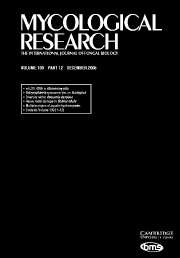Crossref Citations
This article has been cited by the following publications. This list is generated based on data provided by
Crossref.
Gottlieb, Alexandra M.
and
Wright, Jorge E.
1999.
Taxonomy of Ganoderma from southern South America: subgenus Elfvingia.
Mycological Research,
Vol. 103,
Issue. 10,
p.
1289.
Gottlieb, Alexandra M.
Ferrer, Esther
and
Wright, Jorge E.
2000.
rDNA analyses as an aid to the taxonomy of species of Ganoderma.
Mycological Research,
Vol. 104,
Issue. 9,
p.
1033.
Szedlay, Gyöngyi
2002.
Is the widely used medicinal fungus the Ganoderma lucidum (Fr.) karst. sensu stricto?.
Acta Microbiologica et Immunologica Hungarica,
Vol. 49,
Issue. 2-3,
p.
235.
Foroutan, A.
and
., J.G. Vaidya
2007.
Record of New Species of Ganoderma in Maharashtra India.
Asian Journal of Plant Sciences,
Vol. 6,
Issue. 6,
p.
913.
Bononi, Vera Lucia Ramos
Oliveira, Ademir Kleber Morbeck de
Quevedo, Josiane Ratier de
and
Gugliotta, Adriana de Mello
2008.
Fungos macroscópicos do Pantanal do Rio Negro, Mato Grosso do Sul, Brasil.
Hoehnea,
Vol. 35,
Issue. 4,
p.
489.
Zakaria, L.
Ali, N.S.
Salleh, B.
and
Zakaria, M.
2008.
Molecular Analysis of Ganoderma species from Different Hosts in Peninsula Malaysia.
Journal of Biological Sciences,
Vol. 9,
Issue. 1,
p.
12.
Douanla-Meli, Clovis
and
Langer, Ewald
2009.
Ganoderma carocalcareus sp. nov., with crumbly-friable context parasite to saprobe on Anthocleista nobilis and its phylogenetic relationship in G. resinaceum group.
Mycological Progress,
Vol. 8,
Issue. 2,
p.
145.
Welti, Stéphane
and
Courtecuisse, Régis
2010.
The Ganodermataceae in the French West Indies (Guadeloupe and Martinique).
Fungal Diversity,
Vol. 43,
Issue. 1,
p.
103.
Martins Júnior, Alcindo da Silva
Gibertoni, Tatiana Baptista
and
Sotão, Helen Maria Pontes
2011.
Espécies de Ganoderma P. Karst (Ganodermataceae) e Phellinus Quél. (Hymenochaetaceae) na Estação Científica Ferreira Penna, Pará, Brasil.
Acta Botanica Brasilica,
Vol. 25,
Issue. 3,
p.
531.
Torres-Torres, Mabel Gisela
and
Guzmán-Dávalos, Laura
2012.
The morphology of Ganoderma species with a laccate surface.
Mycotaxon,
Vol. 119,
Issue. 1,
p.
201.
Nudin, Nur Fatihah Hasan
and
S., Siddiquee
2012.
Comparing interfertility data with random amplified microsatellites DNA (RAMS) studies in Ganoderma Karst. Taxonomy.
Molecular Biology Reports,
Vol. 39,
Issue. 3,
p.
2861.
Bhansali, Rikhab Raj
2012.
Plant Defence: Biological Control.
p.
209.
Cao, Yun
Wu, Sheng-Hua
and
Dai, Yu-Cheng
2012.
Species clarification of the prize medicinal Ganoderma mushroom “Lingzhi”.
Fungal Diversity,
Vol. 56,
Issue. 1,
p.
49.
Cao, Yun
and
Yuan, Hai-Sheng
2013.
Ganoderma mutabile sp. nov. from southwestern China based on morphological and molecular data.
Mycological Progress,
Vol. 12,
Issue. 1,
p.
121.
Torres-Torres, Mabel Gisela
Guzmán-Dávalos, Laura
and
de Mello Gugliotta, Adriana
2013.
Ganoderma in Brazil: known species and new records.
Mycotaxon,
Vol. 121,
Issue. 1,
p.
93.
Richter, Christian
Wittstein, Kathrin
Kirk, Paul M.
and
Stadler, Marc
2015.
An assessment of the taxonomy and chemotaxonomy of Ganoderma.
Fungal Diversity,
Vol. 71,
Issue. 1,
p.
1.
Li, Tai-Hui
Hu, Hui-Ping
Deng, Wang-Qiu
Wu, Sheng-Hua
Wang, Dong-Mei
and
Tsering, Tamdrin
2015.
Ganoderma leucocontextum, a new member of the G. lucidum complex from southwestern China.
Mycoscience,
Vol. 56,
Issue. 1,
p.
81.
Tonjock, Rosemary Kinge
Afui, Mathias Mih
Marcelo, dos Santos Neves
Diego, Rayan Teixeira de Sousa
and
Maria, Zeli Moreira Frota
2015.
Diversity and distribution of species of Ganoderma in south western Cameroon.
Journal of Yeast and Fungal Research,
Vol. 6,
Issue. 2,
p.
17.
Shrivastava, Neeraj
Kumar, Vivek
Kumar, Manoj
Lou, Binggan
Varma, Ajit
and
Kamal, Shwet
2017.
Modern Tools and Techniques to Understand Microbes.
p.
103.
Cabarroi-Hernández, Milay
Villalobos-Arámbula, Alma Rosa
Torres-Torres, Mabel Gisela
Decock, Cony
and
Guzmán-Dávalos, Laura
2019.
The Ganoderma weberianum-resinaceum lineage: multilocus phylogenetic analysis and morphology confirm G. mexicanum and G. parvulum in the Neotropics.
MycoKeys,
Vol. 59,
Issue. ,
p.
95.


